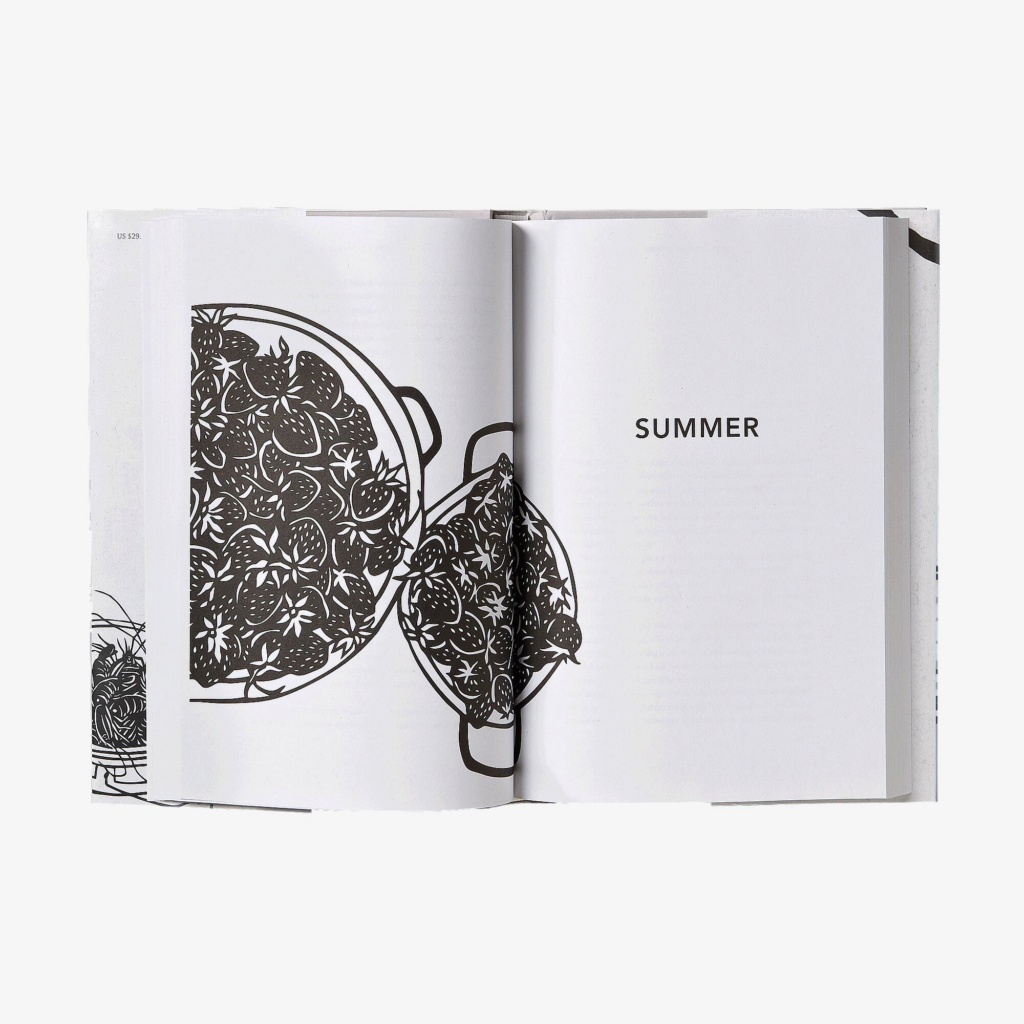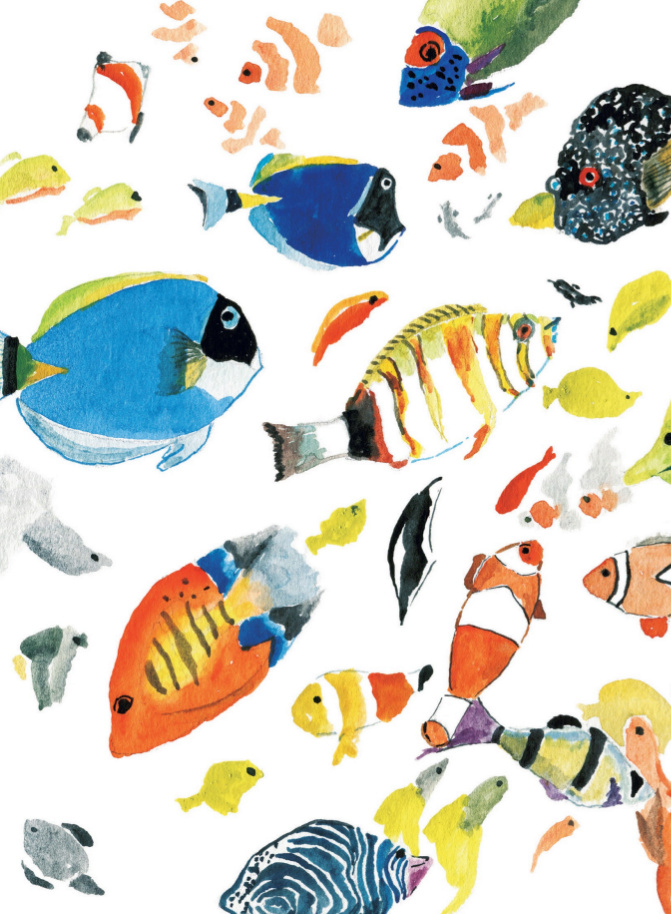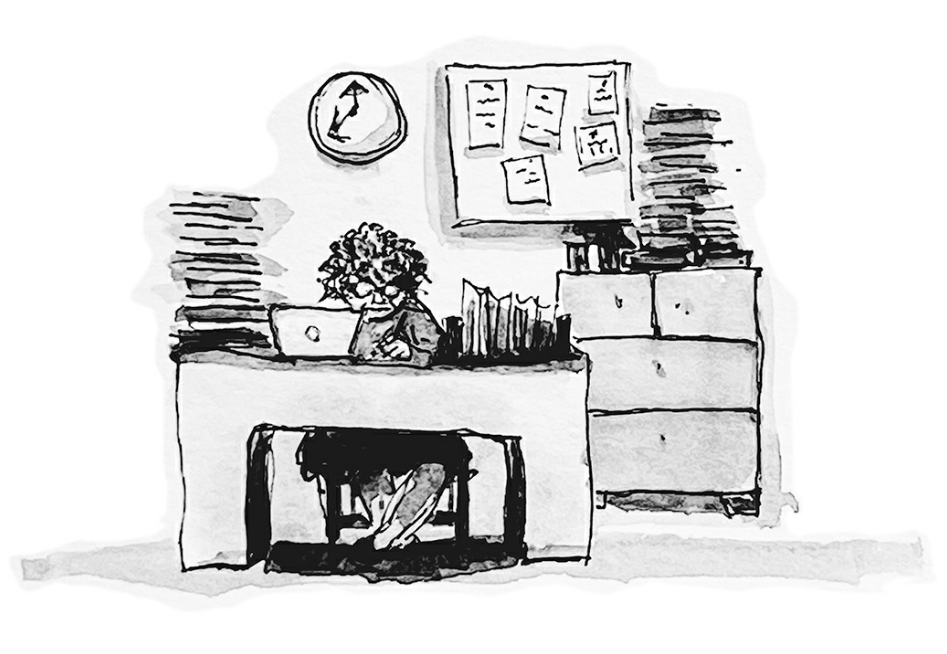In English please
+5
Epi
domreader
Arabella
darkanny
kenavo
9 participants
Page 3 sur 3
Page 3 sur 3 •  1, 2, 3
1, 2, 3
 Re: In English please
Re: In English please
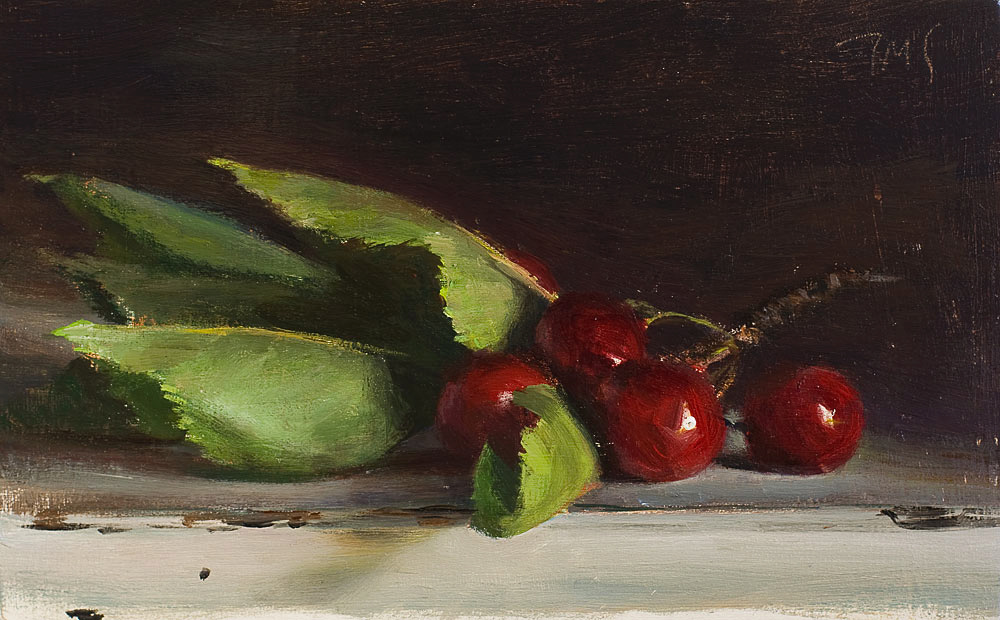
Cherry-Time, Robert Frost
Cherries of the night are riper
Than the cherries pluckt at noon
Gather to your fairy piper
When he pipes his magic tune:
Merry, merry,
Take a cherry;
Mine are sounder,
Mine are rounder,
Mine are sweeter
For the eater
Under the moon.
And you’ll be fairies soon.
In the cherry pluckt at night,
With the dew of summer swelling,
There’s a juice of pure delight,
Cool, dark, sweet, divinely smelling.
Merry, merry,
Take a cherry;
Mine are sounder,
Mine are rounder,
Mine are sweeter
For the eater
In the moonlight.
And you’ll be fairies quite.
When I sound the fairy call,
Gather here in silent meeting,
Chin to knee on the orchard wall,
Cooled with dew and cherries eating.
Merry, merry,
Take a cherry;
Mine are sounder,
Mine are rounder,
Mine are sweeter.
For the eater
When the dews fall.
And you’ll be fairies all.
_________________
Life is a lot like Jazz
Best when you improvise
George Gershwin
 Re: In English please
Re: In English please
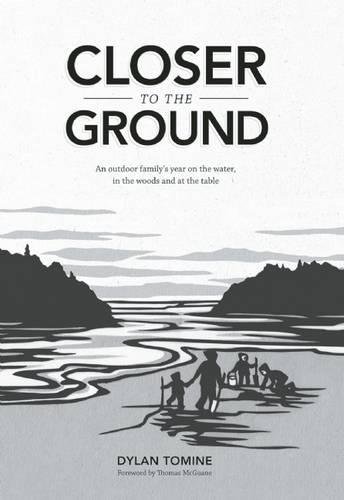
Dylan Tomine, Closer to the Ground
Présentation de l’éditeur
Closer to the Ground is the deeply personal story of a father learning to share his love of nature with his children, not through the indoor lens of words or pictures, but directly, palpably, by exploring the natural world as they forage, cook and eat from the woods and sea.
This compelling, masterfully written tale follows Dylan Tomine and his family through four seasons as they hunt chanterelles, fish for salmon, dig clams and gather at the kitchen table, mouths watering, to enjoy the fruits of their labor.
Closer to the Ground captures the beauty and surprise of the natural world--and the ways it teaches us how to live--with humor, gratitude and a nose for adventure as keen as a child's. It is a book filled with weather, natural history and many delicious meals.
With illustrations by Nikki McClure.
Je suis tombée sur ce livre de Dylan Tomine mais il n’y a pas de version française. Fallait trouver un moyen de le caser quand même sur le forum
Et voilà, il y a des illustrations de Nikki McClure, quoi de mieux de lui ouvrir un fil et parler de ce sublime Closer to the Ground. Ce roman n'appartient pas dans le domaine de la jeunesse, mais pour l’instant je vais en parler ici
et sur plein d’autres fils, trop bon pour ne pas en faire des éloges un peu partout
Si je ne me trompe pas, j’ai trouvé ce livre lors de recherches autour de la cuisine/nourriture. Dylan Tomine parle en effet beaucoup de ce volet. Et c’est difficile de n’avoir pas faim tout au long de cette lecture.
Mais en plus il y a les saisons. La vie de cette famille se passe pendant beaucoup de temps à l’extérieur, ainsi la nature et surtout le climat prennent une bonne partie des descriptions. Tout cela donne déjà envie de s’y rendre pour faire une petite visite.
En plus j’adore sa relation avec ses enfants. C’est extraordinaire. Et décrit de si belle façon.
Un livre à lire et relire… grand coup de cœur.
_________________
Life is a lot like Jazz
Best when you improvise
George Gershwin
 Re: In English please
Re: In English please
Le titre de ce fil est In English please... mais cela convient aussi pour les livres en allemand 
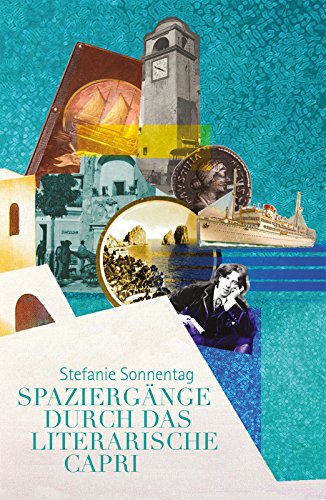
Stefanie Sonnentag, Spaziergänge durch das literarische Capri
Promenades à travers Capri littéraire
Ainsi j’ai profité de faire quelques séjours sur cette île, non seulement avec la lecture d’un classique mais aussi des romans et autres… malheureusement deux de ces textes ne sont pas traduits, dont celui-ci.
Je comprends assez bien pourquoi il n’y a pas de version française de ce livre.
Stefanie Sonnentag (quel joli nom Sonnentag =jour de soleil) décrit 7 promenades, 6 à travers l’île et une à Naples.
C’est réjouissant (avec des photos ce serait un vrai bijou), mais pour la plupart on rencontre des artistes et surtout auteurs dont on n’a pas gardé beaucoup de traces.
Célèbre à la fin du 19ième, début 20ième siècle, bon nombre des personnes qu’elle cite, sont tombées dans l’oubli et surtout la moitié des auteurs qu’elle mentionne sont des Allemands et même avec mes connaissances du monde germanophone, je ne connaissais pas la moitié des noms.
Ainsi ce petit livre était pour moi la bonne entrée sur l’île… et qui m’a surtout donné envie de découvrir d’autres textes/romans autour de Capri.
On peut retrouver bon nombre de ses artistes dans ce commentaire:
The writers, artists and aristocrats who fell in love with Capri

Stefanie Sonnentag, Spaziergänge durch das literarische Capri
Promenades à travers Capri littéraire
Ayant visité l’île de Capri il y a fort longtemps moi-même, je garde quand même des souvenirs bien précis et même si ce n’est pas prévu d’y retourner à l’immédiat, c’est toujours possible de le faire via la littérature.Présentation de l’éditeur
Bienvenue à Capri!
Découvrez l'île sur les traces des écrivains et des artistes!
Que vous voyagiez à Capri avec ce livre à la main ou que vous le lisiez confortablement, assis dans votre fauteuil à la maison, les chapitres suivants vous emmènent à travers les ruelles de l'île vers les villas, les baies maritimes et les lieux magiques par lesquels les écrivains et peintres ont été charmé des décennies avant vous.
Au cours de sept promenades, vous découvrirez l'île sous toutes ses facettes: votre guide littéraire vous guidera de haut en bas des collines, il vous guidera à travers l'île et en bateau autour d'elle.
Découvrez des faits intéressants et des faits historiques sur Capri et partagez les expériences d'écrivains de renom, laissez-vous inspirer par les lettres et les entrées de journal, les poèmes et les romans.
Ainsi j’ai profité de faire quelques séjours sur cette île, non seulement avec la lecture d’un classique mais aussi des romans et autres… malheureusement deux de ces textes ne sont pas traduits, dont celui-ci.
Je comprends assez bien pourquoi il n’y a pas de version française de ce livre.
Stefanie Sonnentag (quel joli nom Sonnentag =jour de soleil) décrit 7 promenades, 6 à travers l’île et une à Naples.
C’est réjouissant (avec des photos ce serait un vrai bijou), mais pour la plupart on rencontre des artistes et surtout auteurs dont on n’a pas gardé beaucoup de traces.
Célèbre à la fin du 19ième, début 20ième siècle, bon nombre des personnes qu’elle cite, sont tombées dans l’oubli et surtout la moitié des auteurs qu’elle mentionne sont des Allemands et même avec mes connaissances du monde germanophone, je ne connaissais pas la moitié des noms.
Ainsi ce petit livre était pour moi la bonne entrée sur l’île… et qui m’a surtout donné envie de découvrir d’autres textes/romans autour de Capri.
On peut retrouver bon nombre de ses artistes dans ce commentaire:
The writers, artists and aristocrats who fell in love with Capri
_________________
Life is a lot like Jazz
Best when you improvise
George Gershwin
 Re: In English please
Re: In English please
trouvé dans Regarde comme c'est beau
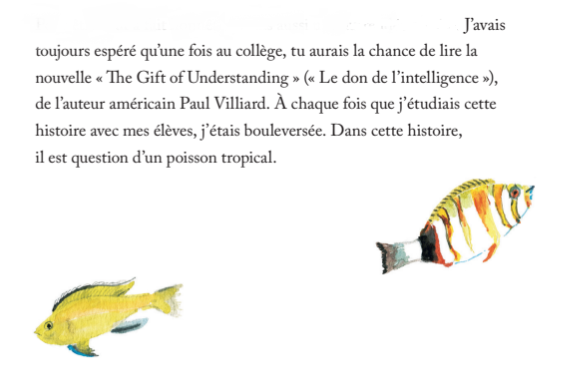
j’ai trouvé la nouvelle dont Grandma Marina parle sur cette page, quel beau moment de lecture
Paul Villiard, The Gift of Understanding
I must have been around four years old when I first entered Mr. Wigden's candy shop, but the smell of that wonderful world of penny treasures still comes back to me clearly more than a half-century later. Whenever he heard the tiny tinkle of the bell attached to the front door, Mr. Wigden quietly appeared, to take his stand behind the candy case. He was very old, and his head was topped with a cloud of fine, snow-white hair.
Never was such an array of delicious temptations spread before a child. It was almost painful to make a choice. Each kind had first to be savored in the imagination before passing on to the next. There was always a short pang of regret as the selection was dropped into a little white paper sack. Perhaps another kind would taste better? Or last longer? Mr. Wigden had a trick of scooping your selection into the sack, then pausing. Not a word was spoken, but every child understood that Mr. Wigden's raised eyebrows constituted a last-minute opportunity to make an exchange. only after payment was laid upon the counter was the sack irrevocably twisted shut and the moment of indecision ended.
Our house was two blocks from the streetcar line,and you had to pass the shop going to and from the cars. Mother had taken me into town on some forgotten errand, and as we walked home from the trolley Mother turned into Mr. Wigden's.
"Let's see if we can find something good," she said, leading me up, to the long glass case as the old man approached from behind a curtained aperture. My mother stood talking with him for a few minutes as I gazed rapturously at the display before my eyes. Finally Mother picked out something for me and paid Mr. Wigden.
Mother went into town once or twice a week, and, since in those days baby-sitters were almost unheard of, I usually accompanied her. It became a regular routine for her to take me into the candy shop for some special treat, and after that first visit I was always allowed to make my own choice.
I knew nothing of money at that time. I would watch my mother hand something to people, who would then hand her a package or a bag, and slowly the idea of exchange percolated into my mind. Sometime about then I reached a decision. I would journey the interminable two blocks to Mr. Wigden's all alone. I remember the tinkle of the bell as I managed, after some considerable effort, to push open the big door. Enthralled, I worked my way slowly down the display counter.
Here were spearmint leaves with a fresh minty fragrance. There, gumdrops -- the great big ones, so tender to bite into, all crusty with crystals of sugar. In the next tray were fudgy chocolate babies. The box behind them held enormous jawbreakers which made a satisfying bulge in your cheek. The hard, shiny, dark-brown-covered peanuts Mr. Wigden dished out with a little wooden scoop -- two scoops for a cent. And, of course, there were the licorice whips. These lasted a long time if you let the bites dissolve instead of chewing them.
When I had picked out a promising assortment, Mr. Wigden leaned over and asked, "You have the money to pay for all these?"
"Oh, yes," I replied, "I have lots of money." I reached out my fist, and into Mr. Wigden's open hand I dumped a half-dozen cherry seeds carefully wrapped in shiny tin-foil.
Mr. Wigden stood gazing at the palm of his hand; then he looked searchingly at me for a long moment.
"Isn't it enough?" I asked him anxiously.
He sighed gently. "I think it is a bit too much," he answered. "You have some change coming." He walked over to his old-fashioned cash register and cranked open the drawer. Returning to the counter, he leaned over and dropped two pennies into my outstretched hand.
My mother scolded me about taking the trip alone when she found me out. I don't think it ever occurred to her to ask about the financial arrangement. I was simply cautioned not to go again unless I asked first. I must have obeyed and, evidently, when permission was granted for me to make the trip, a cent or two was given me for my purchases, since I don't remember using cherry seeds a second time. In fact, the whole affair, insignificant to me then, was soon forgotten in the busy occupation of growing up.
When I was six or seven years old my family moved east, where I grew up, eventually married and established my own family. My wife and I opened a shop where we bred and sold exotic fish. The aquarium trade was then still in its infancy, and most of the fish were imported directly from Asia, Africa and South America. Few species sold for less than five dollars a pair.
One sunny afternoon a little girl came in accompanied by her brother. They were perhaps five and six years old. I was busy cleaning the tanks. The two children stood with wide, round eyes, staring at the jewelled beauties swimming in the crystal-clear water. "Gosh", exclaimed the boy, "can we buy some?"
"Yes", I replied. "If you can pay for them."
"Oh, we have lots of money," the little girl said confidently.
Something in the way she spoke gave me an odd feeling of familiarity. After watching the fish for some time, they asked me for pairs of several different kinds, pointing them out as they walked down the row of tanks. I netted their choices into a traveling container and slipped it into an insulated bag for transport, handing it to the boy. "Carry it carefully," I cautioned.
He nodded and turned to his sister. "You pay him," he said. I held out my hand, and as her clenched fist approached me I suddenly knew exactly what was going to happen, even what the little girl was going to say. Her fist opened, and into my outstretched palm she dumped two nickels and a dime.
At that instant I sensed the full impact of the legacy Mr. Wigden had given me so many years before. only now did I recognize the challenge I had presented the old man, and realize how wonderfully he had met it.
I seemed to be standing again in the little candy shop as I looked at the coins in my own hand. I understood the innocence of the two children and the power to preserve or destroy that innocence, as Mr. Wigden had understood those long years ago. I was so filled up with the remembering that my throat ached. The little girl was standing expectantly before me. "Isn't it enough?" she asked in a small voice.
"It's a little too much," I managed to say, somehow, over the lump in my throat. "You have some change coming." I rummaged around in the cash drawer, dropped two pennies into her open hand, then stood in the doorway watching the children go down the walk carefully carrying their treasure.
When I turned back into the shop, my wife was standing on a stool with her arms submerged to the elbows in a tank where she was rearranging the plants. "Mind telling me what that was all about?" she asked. "Do you know how many fish you gave them?"
"About 30 dollars' worth," I answered, the lump still in my throat. "But I couldn't have done anything else."
When I'd finished telling her about old Mr. Wigden, her eyes were wet, and she stepped off the stool and gave me a gentle kiss on the cheek.
"I still smell the gumdrops," I sighed, and I'm certain I heard old Mr. Wigden chuckle over my shoulder as I swabbed down the last tank.

j’ai trouvé la nouvelle dont Grandma Marina parle sur cette page, quel beau moment de lecture

Paul Villiard, The Gift of Understanding
I must have been around four years old when I first entered Mr. Wigden's candy shop, but the smell of that wonderful world of penny treasures still comes back to me clearly more than a half-century later. Whenever he heard the tiny tinkle of the bell attached to the front door, Mr. Wigden quietly appeared, to take his stand behind the candy case. He was very old, and his head was topped with a cloud of fine, snow-white hair.
Never was such an array of delicious temptations spread before a child. It was almost painful to make a choice. Each kind had first to be savored in the imagination before passing on to the next. There was always a short pang of regret as the selection was dropped into a little white paper sack. Perhaps another kind would taste better? Or last longer? Mr. Wigden had a trick of scooping your selection into the sack, then pausing. Not a word was spoken, but every child understood that Mr. Wigden's raised eyebrows constituted a last-minute opportunity to make an exchange. only after payment was laid upon the counter was the sack irrevocably twisted shut and the moment of indecision ended.
Our house was two blocks from the streetcar line,and you had to pass the shop going to and from the cars. Mother had taken me into town on some forgotten errand, and as we walked home from the trolley Mother turned into Mr. Wigden's.
"Let's see if we can find something good," she said, leading me up, to the long glass case as the old man approached from behind a curtained aperture. My mother stood talking with him for a few minutes as I gazed rapturously at the display before my eyes. Finally Mother picked out something for me and paid Mr. Wigden.
Mother went into town once or twice a week, and, since in those days baby-sitters were almost unheard of, I usually accompanied her. It became a regular routine for her to take me into the candy shop for some special treat, and after that first visit I was always allowed to make my own choice.
I knew nothing of money at that time. I would watch my mother hand something to people, who would then hand her a package or a bag, and slowly the idea of exchange percolated into my mind. Sometime about then I reached a decision. I would journey the interminable two blocks to Mr. Wigden's all alone. I remember the tinkle of the bell as I managed, after some considerable effort, to push open the big door. Enthralled, I worked my way slowly down the display counter.
Here were spearmint leaves with a fresh minty fragrance. There, gumdrops -- the great big ones, so tender to bite into, all crusty with crystals of sugar. In the next tray were fudgy chocolate babies. The box behind them held enormous jawbreakers which made a satisfying bulge in your cheek. The hard, shiny, dark-brown-covered peanuts Mr. Wigden dished out with a little wooden scoop -- two scoops for a cent. And, of course, there were the licorice whips. These lasted a long time if you let the bites dissolve instead of chewing them.
When I had picked out a promising assortment, Mr. Wigden leaned over and asked, "You have the money to pay for all these?"
"Oh, yes," I replied, "I have lots of money." I reached out my fist, and into Mr. Wigden's open hand I dumped a half-dozen cherry seeds carefully wrapped in shiny tin-foil.
Mr. Wigden stood gazing at the palm of his hand; then he looked searchingly at me for a long moment.
"Isn't it enough?" I asked him anxiously.
He sighed gently. "I think it is a bit too much," he answered. "You have some change coming." He walked over to his old-fashioned cash register and cranked open the drawer. Returning to the counter, he leaned over and dropped two pennies into my outstretched hand.
My mother scolded me about taking the trip alone when she found me out. I don't think it ever occurred to her to ask about the financial arrangement. I was simply cautioned not to go again unless I asked first. I must have obeyed and, evidently, when permission was granted for me to make the trip, a cent or two was given me for my purchases, since I don't remember using cherry seeds a second time. In fact, the whole affair, insignificant to me then, was soon forgotten in the busy occupation of growing up.
When I was six or seven years old my family moved east, where I grew up, eventually married and established my own family. My wife and I opened a shop where we bred and sold exotic fish. The aquarium trade was then still in its infancy, and most of the fish were imported directly from Asia, Africa and South America. Few species sold for less than five dollars a pair.
One sunny afternoon a little girl came in accompanied by her brother. They were perhaps five and six years old. I was busy cleaning the tanks. The two children stood with wide, round eyes, staring at the jewelled beauties swimming in the crystal-clear water. "Gosh", exclaimed the boy, "can we buy some?"
"Yes", I replied. "If you can pay for them."
"Oh, we have lots of money," the little girl said confidently.
Something in the way she spoke gave me an odd feeling of familiarity. After watching the fish for some time, they asked me for pairs of several different kinds, pointing them out as they walked down the row of tanks. I netted their choices into a traveling container and slipped it into an insulated bag for transport, handing it to the boy. "Carry it carefully," I cautioned.
He nodded and turned to his sister. "You pay him," he said. I held out my hand, and as her clenched fist approached me I suddenly knew exactly what was going to happen, even what the little girl was going to say. Her fist opened, and into my outstretched palm she dumped two nickels and a dime.
At that instant I sensed the full impact of the legacy Mr. Wigden had given me so many years before. only now did I recognize the challenge I had presented the old man, and realize how wonderfully he had met it.
I seemed to be standing again in the little candy shop as I looked at the coins in my own hand. I understood the innocence of the two children and the power to preserve or destroy that innocence, as Mr. Wigden had understood those long years ago. I was so filled up with the remembering that my throat ached. The little girl was standing expectantly before me. "Isn't it enough?" she asked in a small voice.
"It's a little too much," I managed to say, somehow, over the lump in my throat. "You have some change coming." I rummaged around in the cash drawer, dropped two pennies into her open hand, then stood in the doorway watching the children go down the walk carefully carrying their treasure.
When I turned back into the shop, my wife was standing on a stool with her arms submerged to the elbows in a tank where she was rearranging the plants. "Mind telling me what that was all about?" she asked. "Do you know how many fish you gave them?"
"About 30 dollars' worth," I answered, the lump still in my throat. "But I couldn't have done anything else."
When I'd finished telling her about old Mr. Wigden, her eyes were wet, and she stepped off the stool and gave me a gentle kiss on the cheek.
"I still smell the gumdrops," I sighed, and I'm certain I heard old Mr. Wigden chuckle over my shoulder as I swabbed down the last tank.
_________________
Life is a lot like Jazz
Best when you improvise
George Gershwin
 Re: In English please
Re: In English please
Lovely story !
_________________
'La littérature est une maladie textuellement transmissible, que l'on contracte en général pendant l'enfance'. Jane Yolen.

domreader- Messages : 3627
Date d'inscription : 02/12/2016
Localisation : Ile de France
 Re: In English please
Re: In English please
Histoire : Alice K. Boatwright, illustrations : Jan L. Waldron

Mrs. Potts Finds Thanksgiving
S’inspirant chez Charles Dickens et son Chant de Noël, Alice K. Boatwright a écrit une bien belle histoire.
On va retrouver Mrs Potts à Thanksgiving dans un cadre parfait pour partager un repas.
Tout comme Scrooge, elle va changer au cours de cette journée et elle va représenter par après l’esprit de cette fête à perfection.
Coup de cœur.

Mrs. Potts Finds Thanksgiving
Présentation de l’éditeur
"A rebooted, briskly paced holiday parable that focuses on generosity and community connection." --Kirkus Reviews
In this new holiday classic, inspired by Charles Dickens' A Christmas Carol, the miserly Martha Potts is reminded that there's more to life than work and money after chance encounters with a homeless woman and a stray cat, who comes to stay.
Between Thanksgiving eve and Thanksgiving Day, events unfold that lead her to rediscover the importance of connection and the true meaning of the holiday: giving and gratitude. A perfect holiday season gift. Best enjoyed when read aloud with family and friends!
S’inspirant chez Charles Dickens et son Chant de Noël, Alice K. Boatwright a écrit une bien belle histoire.
On va retrouver Mrs Potts à Thanksgiving dans un cadre parfait pour partager un repas.
Tout comme Scrooge, elle va changer au cours de cette journée et elle va représenter par après l’esprit de cette fête à perfection.
Coup de cœur.
_________________
Life is a lot like Jazz
Best when you improvise
George Gershwin
Page 3 sur 3 •  1, 2, 3
1, 2, 3
Page 3 sur 3
Permission de ce forum:
Vous ne pouvez pas répondre aux sujets dans ce forum
 Accueil
Accueil